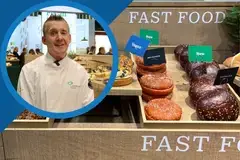
- Industry news
Industry news
- Category news
Category news
- Reports
- Key trends
- Multimedia
- Journal
- Events
- Suppliers
- Home
- Industry news
Industry news
- Category news
Category news
- Reports
- Key trends
- Multimedia
- Events
- Suppliers
Puratos: How data, traceability & plant-based trends shape F&B sustainability

Increased awareness of the environmental impact of F&B production is leading to a surge in demand for sustainable and transparent products among consumers, who scan product labels in supermarkets to make eco-friendly choices. Bakery and chocolate solutions provider Puratos reveals how it is leveraging a trifecta of data, traceability, and farmer partnerships to meet these demands while maintaining cost efficiency.
In this field, sustainable practices such as regenerative farming practices and upcycling food waste have gained popularity, as companies focus on addressing the growing climate, cost, and consumer trust challenges.
Puratos’ current sustainability priority is “implementing a fully data-driven, end-to-end approach to sustainability to measure, understand, and reduce its impact across the entire value chain,” Francesca Angiulli, Puratos’ sustainability director tells Food Ingredients First.

“Rooted in LCAs, which are comprehensive studies that evaluate environmental impacts throughout a product’s entire lifecycle, we intend to demonstrate standardized measurement of environmental performance.”
Leveraging emotional demands
Angiulli highlights the “memorable experiences” trend that has recently emerged in food, which can potentially reframe the industry’s sustainability strategy.
She explains that “emotionally resonant, sensory-rich, and personalized moments” related to food appeal to consumers, who increasingly value product stories about sustainability, origin, and artisanal craftsmanship.
In terms of consumer trends, Puratos’ sustainability initiatives are driven by its Taste Tomorrow research, which aims for “extremely detailed and timely information about their preferences, curiosities, and needs.”
 Sustainability is not a cost burden, but a long-term success investment, says Angiulli.She adds that plant-based demands remain a “powerful driver of the whole sector,” transforming from a niche for 100% vegan consumers into a mainstream trend, with the rapid growth of the flexitarian segment.
Sustainability is not a cost burden, but a long-term success investment, says Angiulli.She adds that plant-based demands remain a “powerful driver of the whole sector,” transforming from a niche for 100% vegan consumers into a mainstream trend, with the rapid growth of the flexitarian segment.
“Interestingly, it has implications for sustainability too. Consumers now recognize that plant-based ingredients and foods often carry a much lower environmental footprint than their animal-based counterparts. Plant-based may have shifted, but it will continue to shape the industry’s sustainability journey,” she explains.
Measuring food emissions
Studies show that food production contributes to nearly 26% of GHG emissions. In response, manufacturers are increasingly focusing on measuring and understanding the environmental footprint of their operations.
Angiulli details that Puratos collaborates with customers and suppliers, both upstream and downstream, to measure exactly where negative impact comes from.
The company also partners with farmers and cooperatives who adopt regenerative agriculture practices, as in the case of producing the company’s Sapore sourdoughs.
“Made with wheat sourced from farms practicing regenerative agriculture, they include the recently-launched Sapore Lavida, the first completely traceable active sourdough produced in Belgium, and Sapore Sally, the first of its kind in the UK,” Angiulli elaborates.
“We’re also making our operations more sustainable with the aim to be carbon-neutral in our own operations by the end of this year. Additionally, our solutions that either reduce or replace sugar and animal-derived ingredients like fat and eggs help customers reduce their environmental impact.”
Partnering for sustainability
Angiulli says Puratos’ sustainability strategy is “multifaceted,” with farmers considered critical to its business. The company recently announced €7 million (US$8 million) in direct payments to cocoa farmers in 2024 in its Cacao-Trace report.
 Resilient farmers are critical for a resilient food system.She stresses that resilient farmers are critical for a “resilient food system.” “Through Cacao-Trace, we work closely with cocoa farmers to collectively master, monitor, and improve fermentation processes to produce high-quality, delicious cocoa.”
Resilient farmers are critical for a resilient food system.She stresses that resilient farmers are critical for a “resilient food system.” “Through Cacao-Trace, we work closely with cocoa farmers to collectively master, monitor, and improve fermentation processes to produce high-quality, delicious cocoa.”
Puratos also partners with scientists, start-ups, and ingredient suppliers to accelerate sustainable solutions, and recently signed the Sustainable Wheat Initiative Europe manifesto.
Partnering with its customers ensures sustainability initiatives are both “environmentally effective and commercially viable,” she explains.
Balancing cost and scalability
Angiulli stresses that sustainability is “not a cost burden,” but a long term success investment for Puratos.
“There’s a persistent misconception that sustainable ingredients invariably cost more, but our experience demonstrates otherwise. On the contrary, we have made calculations for our customers showing that sustainable practices frequently drive significant cost savings.”
For instance, the company develops its sustainable brioche solutions using “low impact ingredients” such as plant-based alternatives to eggs and butter, which can be costly. These can provide “immediate benefit to both sustainability goals and operational costs while strengthening supply chain resilience.”
This is relevant at a time when over 65% of consumers worldwide according to Puratos’ Taste Tomorrow study are looking for foods with sustainability-related claims. One in three are even prepared to pay a premium for such products, and nearly 65% actively seek food where they know farmers receive fair prices and living incomes, she adds.
Toward sustainable transformation
Looking ahead, Angiullu expects the greatest sustainability opportunities to be in data transparency and traceability.
 Data transparency and traceability offer the most sustainability opportunities despite challenges.“While these present significant challenges — food supply chains are inherently complex and data is often fragmented across multiple stakeholders — these challenges represent extraordinary opportunities for transformation.”
Data transparency and traceability offer the most sustainability opportunities despite challenges.“While these present significant challenges — food supply chains are inherently complex and data is often fragmented across multiple stakeholders — these challenges represent extraordinary opportunities for transformation.”
She adds that successfully addressing these complexities creates substantial value. “It builds authenticity and consumer trust, enables companies to substantiate sustainability claims with robust evidence, and pinpoints precisely where to reduce emissions, waste, and operational costs.”
“Businesses that can deliver genuine sustainability credentials backed by data and transparent practices will lead this transformation.”
The company is working on comprehensive traceability programs that track ingredients from “farm to final product,” coupled with transparent communication across its value chain.















